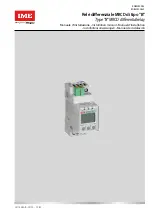
BE1-CDS220 General
Information
1-3
General Purpose Logic Timers
•
Two general purpose logic timers with six modes of operation: 62, 162.
Virtual Control Switches
•
One virtual breaker control switch, accessible locally from the optional HMI or remotely from the
communications ports, can be used to provide trip and close control of a selected breaker: 101.
•
The breaker label provided for the breaker monitoring function is used to label the virtual breaker
control switch. This makes it easily discernible which breaker is being controlled since there is
often more than one breaker associated with the differential zone of protection.
•
Eight virtual switches with three modes of operation, accessible locally from the optional HMI or
remotely from the communications ports, can be used to provide additional control; for example,
to trip and close additional switches or breakers, or to enable and disable certain functions such
as 43, 143, 243, 343, 443, 543, 643, 743.
Metering
•
Metering is provided for all measured phase and neutral currents and all derived neutral and
negative sequence currents.
•
Metering is also provided for the phase and tap compensated restraint, 2nd and 5th harmonic,
and differential currents.
Reporting and Alarm Functions
Relay Identification
•
The relay includes four 30-character, free-form fields for the user to enter information to identify
the relay. Examples would be station name, circuit number, relay system, purchase order, etc.
These fields are used by many of the reporting functions to identify which relay created the report.
Clock
•
A real-time clock is included with a capacitor backup that will keep time upon loss of power for 8
to 24 hours depending upon conditions.
•
A standard IRIG input (Format B002 from IRIG Standard 200-98) is provided for receiving time
synch signals from a master clock.
•
The time reporting format is settable for 12 or 24 hour format and for mm/dd/yy or dd/mm/yy
format.
•
Automatic daylight savings time adjustment can be enabled.
General Status Reporting
•
The relay has extensive capability to report its general status for monitoring, commissioning, and
trouble shooting.
•
Status reports are available from the optional HMI or the communications ports.
Demand Reporting
•
Ampere demand registers are provided for monitoring A, B, C, N, and Q. These registers are
assignable to any of the current input circuits.
•
The demand interval and demand calculation method is separately settable for phase, neutral,
and negative-sequence measurements.
•
The demand reporting function records today’s peak, yesterday’s peak, and peak since reset with
time stamps for each register.
•
An optional 4000 point data array can record over 40 days of 15 minute demand data.
Differential Current Monitoring
•
A detailed current check record can be requested from the relay to aid in initial in-service
readings to verify correct phase and tap compensation of the differential currents. This report can
be stored with commissioning records to save time during initial check out.
•
Once in service, the mismatch in the differential function is continuously monitored and can
provide an alarm if the mismatch is approaching a trip condition due to loading current. A current
check record is generated when this occurs and the diagnostic function will indicate the possible
source of the mismatch: for example, incorrect or missing phase compensation.
Summary of Contents for BE1-CDS220
Page 2: ......
Page 10: ...viii Introduction BE1 CDS220 This page intentionally left blank...
Page 36: ...ii Quick Start BE1 CDS220 This page intentionally left blank...
Page 48: ...ii Input And Output Functions BE1 CDS220 This page intentionally left blank...
Page 66: ...iv Protection and Control BE1 CDS220 This page intentionally left blank...
Page 112: ...ii Metering BE1 CDS220 This page intentionally left blank...
Page 116: ...5 4 Metering BE1 CDS220 This page intentionally left blank...
Page 166: ...ii BESTlogic Programmable Logic BE1 CDS220 This page intentionally left blank...
Page 176: ...7 10 BESTlogic Programmable Logic BE1 CDS220 This page intentionally left blank...
Page 234: ...8 56 Application BE1 CDS220 This page intentionally left blank...
Page 236: ...ii Security BE1 CDS220 This page intentionally left blank...
Page 240: ...9 4 Security BE1 CDS220 This page intentionally left blank...
Page 242: ...ii Human Machine Interface BE1 CDS220 This page intentionally left blank...
Page 256: ...10 14 Human Machine Interface BE1 CDS220 This page intentionally left blank...
Page 258: ...ii ASCII Command Interface BE1 CDS220 This page intentionally left blank...
Page 422: ...14 32 BESTCOMS Software BE1 CDS220 This page intentionally left blank...
Page 424: ...ii Time Current Characteristics BE1 CDS220 This page intentionally left blank...
Page 452: ...ii Terminal Communication BE1 CDS220 This page intentionally left blank...
Page 456: ...C 4 Terminal Communication BE1 CDS220 This page intentionally left blank...
Page 458: ...ii Settings Calculations BE1 CDS220 This page intentionally left blank...
Page 475: ......
















































